English CBSE Class 12 NCERT Flamingo Chapter 1 The Last Lesson Free Solution of Extra Questions and Answers – Extract Based Questions Short Answer Questions Long Answer Questions and Value Based Questions
THE LAST LESSON
(Extra Questions)
Extract Based Questions


1. Who is referred as ‘I’ in the above extract?
2. What is the profession of M. Hamel?
3. Which word in the extract mean ‘firing’?
4. What was M Hamel likely to question about ?
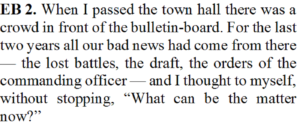

1. Where was ‘I’ going to ?
2. What order was displayed on the notice board that day?
3. Why did ‘I’ did not stop to read the bulletin board?
4. Which word in the extract is antonym of ‘won’.


1. Who is the speaker of above extract?
2. Where had the speaker reached?
3. Which word in the extract mean ‘lot of noise’?
4. Where were elders of the town sitting in the class’?


1. Why it was the last lesson?
2. Why was the speaker surprised about most?
3. Which word in the extract is antonym of ‘rude’?
4. Where was the house of M Hamel?


1. Who is referred to as ‘they’ in above extract?
2. For how long had Hamel worked in the school?
3. Why their country was theirs no more?
4. Which word in the extract is antonym of ‘selfish’?
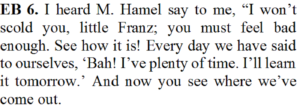

1. Who is speaker of above extract?
2. After what incident Hamel said ‘I won’t scold you’ …?
3. Which word in the extract mean ‘lot of ’?
4. In reference to above extract, is it correct to postpone our work?


1. Who is referred as ‘poor man’?
2. Which phrase of the extract mean ‘in the first attempt’?
3. Why was ‘poor man’ going away?
4. Who used to live with ‘poor man’ at his house?


1. Who is referred as ‘he’ in above extract?
2. What two things had ‘he’ brought with him?
3. Which word in the extract mean ‘unsteady’?
4. Why ‘we’ all wanted to laugh and cry?


(i) Who are ‘they’ here?
(ii) Why is M.Hamel’s heart broken?
(iii) Why do they have to leave the country?
(iv) Who is packing the trunks?
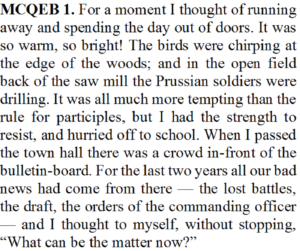

(i) ‘It was all much more tempting than the rule for participles’. From this line one can infer that following subject was to be taught at school
(a) Science
(b) Geography
(c) Language
(d) Mathematics
(ii) Why do you think a bulletin board was installed at the town hall?
(a) it was the central place of the town
(b) it was a lonely place of the town
(c) it did not have any traffic
(d) it was the brightest place in the town
(iii) “What can be the matter now?” This sentence indicates which of the following emotion of the speaker
(a) happiness
(b) worry
(c) negligence
(d) anger
(iv) The environment outdoors was
(a) pleasant
(b) tempting
(c) active
(d) all the above
(iv) Which of the following was never displayed on the notice board
(a) the lost war
(b) the draft
(c) orders from the commanding officer
(d) weather forecast
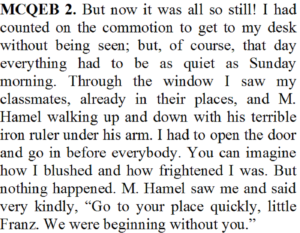
(i) Franz had expected the school to be
(a) noisy
(b) spotless
(c) silent
(d) bright
(ii) Which style of writing has been used in ‘that day everything had to be as quiet as Sunday morning’?
(a) hyperbole
(b) simile
(c) pun
(d) allegory
(iii) According to the extract M. Hamel seemed to be
(a) worried
(b) puzzled
(c) sad
(d) happy
(iv) ‘We were beginning without you’ implies that
(a) the teacher started to expel Franz
(b) the class was about to start
(c) lot of time was left to start the class
(d) the class had already begun
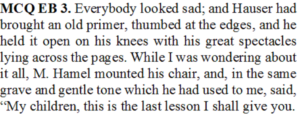

(i) What does the phrase ‘old primer’ mean
(a) Old saucer
(b) Old book
(c) Old bag
(d) Old newspaper
(ii) “grave and gentle tone’ implies that voice of M. Hammel was
(a) dead and harsh
(b) happy and polite
(c) sad and soft
(d) sharp and smooth
(iii) What could have been emotions of the narrator after hearing words of M. Hammel?
1. Happiness
2. Shock
3. Puzzle
4. Anger
(a) 1 and 4
(b) 2 and 3
(c) 3 and 4
(d) 2 and 4
(iv) Why was everybody looking sad?
(a) Narrator was late to the class
(b) Hammel was sitting on the chair
(c) They knew that it was the last lesson
(d) Hauser had brought an old primer
(v) What does the word ‘great’ imply in the extract?
(a) Fantastic
(b) Costly
(c) Big
(d) Wonderful
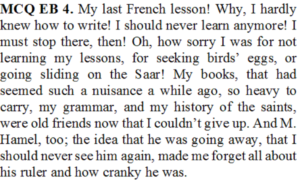

(i) Which of the following does not imply the word ‘cranky’ as used in the extract
(a) Eccentric
(b) Weird
(c) Testy
(d) Intelligent
(ii) Which of the following was not a concern for the narrator?
(a) He hardly knew how to write
(b) Not learning earlier lessons
(c) Hammel was going away for ever
(d) He forgot about the ruler of Hammel
(iii) The narrator did not feel sorry for which of the following activities?
1. He did not learn his lessons
2. He sought brid’s eggs
3. He had old friends
4. He will continue to learn French
(a) 1 and 4
(b) 2 and 3
(c)3 and 4
(d) 2 and 4
(iv) A phrase ‘give up’ has been used in the extract. Which of the following is not the correct use of this phrase?
(a) I decided to give up my bad habit.
(b) The thief gave up to police after a week of hide and seek.
(c) I gave up my holiday to paint my ancestral house.
(d) The teacher gave up a prize to topper of the class
(v) What did the narrator not realise after announcement of that class being the last lesson?
(a) Hammel was going away
(b) He will never see M. Hammel again
(c) Hammel was a cranky person
(d) He wanted to forget about the ruler of M. Hammel
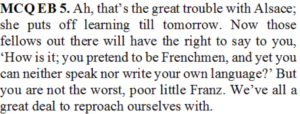

(i) Who is speaker of above extract
(a) Hammel
(b) Franz
(c) Hauser
(d) Wachter
(ii) Why does the speaker refer to Franz as “poor little”?
(a) He has sympathy towards Franz for not learning
(b) He thinks that parents of Franz are not rich
(c) He thinks that Franz does not have patriotism
(d) He wants to tease Franz
(iii) What is Alsace?
(a) A country
(b) A language
(c) A village
(d) A river
(iv) A person who can ‘neither write nor read’ is called ?
(a) Learned
(b) Non-learned
(c) Un-learned
(d) Illiterate
(v) To whom does the phrase ‘those fellows’ as used in the extract, refers to?
(a) Frenchmen
(b) Russians
(c) Indians
(d) Prussians
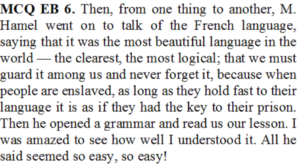

(i) Which of the following quality of M. Hammel is exhibited through his declaration about French language.
(a) He is expert in French language
(b) He is precise in describing French language
(c) He is a patriotic person and takes pride in French language
(d) He can teach French language
(ii) When people are enslaved, what, according to extract, can be a key to their prison?
(a) Forgetting their own language
(b) Enriching their own language
(c) Remembering their own language
(d) Clarifying their own language
(iii) Select the option that best describes the views of M. Hammel.?
(a) If people learn a foreign language, they can easily learn their native language
(b) The native language represents culture of people and we must guard our native language.
(c) Our mother tongue is most important for shaping our career
(d) All the above
(iv) Which of the following cannot be a reason why Franz found the lesson easy ?
(a) Franz was paying attention to the lesson
(b) Hammel was explaining the lesson in best possible way
(c) Franz was aware that French was the easiest language in the world
(d) Franz had an impulse to know French to the greatest extent
(v) A word ‘enslaved’ has been used in the extract? Which of the following cannot enslave us.
(a) Another country
(b) Technology
(c) Emotions
(d) Motivation
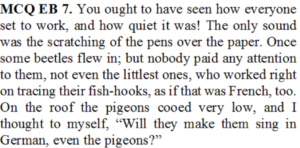

(i) “Will they make them sing in German, even the pigeons?” What emotions are expressed in this line?
(a) Happiness
(b) Sorrow
(c) Satire
(d) Anger
(ii) What activity the ‘little ones’ were carrying out in the class.
(a) Scratching
(b) Singing
(c) Tracing
(d) Cooing
(iii) Please read following statements and based on the extract identify which of these are facts and which are opinions?
1. All students were attentive in the class.
2. It can be inferred that students were of different age groups
3. the teacher should have explained that tracing is not learning of language
4. Students should always do their home-work in time
(a) Fact – 1,3 and Opinion – 2,4
(b) Fact – 2,3 and Opinion – 1,4
(c) Fact – 1,2 and Opinion – 3,4
(d) Fact – 2,4 and Opinion – 1,3
(iv) A phrase ‘ I thought to myself’ has been used in the extract. Which of the following is not the correct use of similar phrase?
(a) I said to myself
(b) I laughed to myself
(c) I read to myself
(d) I sent to myself
(v) Which animal / insect / bird had entered in the class room?
(a) Fish
(b) Beetle
(c) Pigeon
(d) Both (b) and (c)
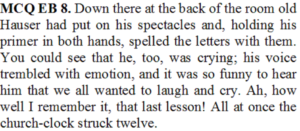

(i) In the expression “spelled the letters with them”, to whom does the word ‘them’ refer to?
(a) Soldiers
(b) Teachers
(c) Piegeons
(d) Students
(ii) A phrase ‘put on’ has been used in the extract. Considering all the uses of this phrase, which of the following in not the correct use of this phrase?
(a) Put on new clothes
(b) Put on weight
(c) Put on make-up
(d) Put on strike
(iii) Why do you think those present in the room wanted to cry as well as laugh?
(a) Somebody had started dancing
(b) Somebody had cracked a joke
(c) Pigeons were cooing melodiously
(d) Voice of Hauser was funny
(iv) A phrase ‘all at once’ has been used in the extract. Which of the following is the not correct meaning phrase?
(a) Abruptly
(b) Suddenly
(c)Instantly
(d) Gradually
(v) How many hands Hauser used to hold his primer?
(a) One
(b) Two
(c) None
(d) All the above
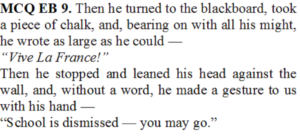

(i) Who has been referred to as ‘he’ in above extract?
(a) Hauser
(b) Wachter
(c) Hammel
(d) Franz
(ii) What is the meaning of “Vive La”?
(a) Very lovely
(b) Very likely
(c) Long live
(d) Very lazy
(iii) Please read following statements and based on the extract identify which of these are facts and which are opinions?
1. He wrote on the blackboard in French.
2. He should have displayed more maturity
3. Rather than gesturing with hands, he should have spoken
4. He felt quite week that day
(a) Fact – 1,3 and Opinion – 2,4
(b) Fact – 2,3 and Opinion – 1,4
(c) Fact – 1,2 and Opinion – 3,4
(d) Fact – 1,4 and Opinion – 2,3
(iv) Which of the following words is closest representation of the emotions of ‘he’?
(a) Sad
(b) Derailed
(c) Helpless
(d) Subservient
(iv) Meaning of which word in the extract is closest to ‘signal’?
(a) large
(b) might
(c) gesture
(d) hand
Short Answer Questions – 30 to 40 words


Answer: M Hamel was to take a test on participles. Franz had not prepared this topic. He says, ‘I did not know a word about them’.
He also found other things like a warm day, birds chirping on the edge of the jungle too tempting.
For these reasons he did not want to go to school that day.


Answer: Franz noticed that it was a warm and bright day. The birds were chirping at the edge of woods. Prussian soldiers were doing drill at the back of the sawmill. Franz found these more tempting than going to school.


Answer: While going to the school Franz saw a crowd in front of the bulletin board. On this bulletin board orders by Germans used to be displayed. He was wondering about the new notice put up on the bulletin board.


Answer: Usually there used to be a great bustle at the opening of school. The sound of opening and closing of desks could be heard. Lessons used to be repeated in loud voice in unison. The sound of rapping of ruler of teacher could be heard from the street.


Answer: M Hamel informed that it was his last lesson. An order had come from Berlin to teach only German in the schools of Alsace and Lorraine. The new teacher would come from tomorrow.
These words were a thunderclap to Franz.


Answer: M Hamel told the class that the French was the most beautiful language in the world. It was the clearest and most logical language.
He asked them to guard the language and not to forget this language.
He reasoned that when people are enslaved, as long as they guard their language, they hold the key to their prison.


Answer: Hamel was taking his last lesson in French. Hamel has been teaching in the school for last forty years. Elders wanted to pay respect to M Hamel. They also wanted to show that they liked their own language.


Answer: M Hamel was very gentle during his last lesson. He kept looking at everything in the classroom one by one. In the last, he wrote on the board ‘Vive La France”
He was full of emotions because it was his last lesson.


Answer: M Hamel did not scold him for being late in the class. Hamel was wearing his ceremonial dress. Presence of some elderly people at the back benches of the class surprised him most.


Answer: Franz was paying his full attention to lesson. Franz thought that he had never paid so much attention. Nor M Hamel had explained with so much patience and emotions.
Owing to above reasons Franz was able to understand everything on that day.


Answer: M Hamel had become very emotional during his last lesson. Still when he got up to write on the blackboard he seemed very confident of himself. Hamel knew what he was going to write.
That is why Franz says, “I never saw him so tall”.


Answer: An order had come from Berlin that only German would be taught in the school. Hamel considered this as an insult to their beloved country France. He was a patriotic person. He wanted people to remember about their nationality and their language.
That is why he wrote these words on blackboard.


Answer: M Hamel was at pains to explain that people of the town had not learnt the French completely. There was no more opportunity to learn French. Now Germans will mock at them for not knowing their own language. He said that everybody in the town, including himself, were responsible for delaying the learning process.
It is this background that he said these words.


Answer: Franz was shocked to listen to the announcement. In fact it was a thunderclap for him and he cursed Germans for issuing this order. He paid full attention to the lesson of that day. He became emotional and his heart was full of respect for Hamel.


Answer: The Germans wanted to enforce their own language in their occupied territory. People of France viewed Germans as their enemies. They wanted to protect their own language and culture.
Thus the theme of patriotism is deeply rooted in the lesson.


Answer: Germans had forced upon their own language in the schools of territory they had occupied. So we can say the lesson represent linguistic jingoism of Germans.
People of France wanted to protect their own language. They felt bad because they had not given enough attention for learning their language.


Answer: Franz started thinking that his books were his old friends that he could not give up. Suddenly Franz developed greater respect towards Hamel. Franz forgot about Hamel’s ruler and that how cranky he was.


Answer: Hamel thought that people of France would soon forget their native language. He believed that if native language was lost, people would become slave forever. This was his real fear.


Answer: He preferred to go to school than stopping stopping at the town hall. He was thinking that Mr Hammel would question him about rules of participles.
Thus Franz was conscious about his studies.


Answer: On that day Franz had started late from his home. Thus he was not likely to reach school in time. He was afraid of scolding he might receive for being late to the school.
So Franz hurried off to school.


Answer: Franz had started late from his home so he was likely to reach late. Franz had not learnt his lesson of participle, thus would not be able to answer any question in the class.
So he was afraid of getting a scolding from his teacher M. Hamel.


Answer: When M Hamel declared that it was the last lesson in French, Franz was shocked . His books of grammar, history and saints now appeared his friends to him. Even Mr M Hamel looked like a friend.


Answer: Everybody was sad. They had become nostalgic about the earlier days. They had become emotional to learn that French would not be taught.
But there was a feeling of resignation and acceptance of turn of events.
Long Answer Questions – 120-150 words


Answer: A new order from Berlin said to teach only German in the schools of Alsace and Lorraine.
It was a shock to everybody. The school was so silent on that day. Everybody was attentive and quiet in the class.
Elders had come to the classroom to pay respect to Hamel. They also wanted to express their attachment to their own language French.
M Hamel had to deliver his last lesson on that day. He wore his ceremonial dress. His behaviour was very kind.
M Hamel told the class that the French was the most beautiful, clearest and most logical language. He asked them to guard the language. He reasoned that when people are enslaved, as long as they guard their language, they hold the key to their prison.
Hamel became very emotional. At the end of the lesson Hamel wrote on the board ‘Vive La France”. He gestured with his hands that school was dismissed.


Answer: The theme of the chapter is the pain inflicted on the people of a territory by the conqueror by taking away their right to study their own language. The lesson also throws light upon attachment among students and teacher and their attitude towards learning.
Language is a means of communication among people. Everyone is most comfortable in their mother tongue. Later when one goes to school and mingles with friends, more awareness about language occurs. One would feel attached to one’s mother tongue.
Suddenly, if a restriction is imposed on use of language, it is a heart breaking situation. It is extremely difficult to switch to another language at once. It is definitely a cruel means to humiliate people. People start feeling that they have not only lost their territory but also their spirituality, emotions and freedom of expression.
In this respect the lesson has a universal appeal.


Answer: The story starts by indicating a large crowd in front of town hall. The noticeable difference in the school could be gauged by the stillness and quietness.
Hamel announces the order from Berlin. He informs that from tomorrow German would be taught in the school. Then it dawns upon everybody that it was the last lesson in French. And the last lesson for Hamel.
M Hamel was wearing his ceremonial dress. The unusual kindness of teacher indicates some special occasion. Presence of elders in the class amplifies importance of day.
Hamel taught with lot of kindness and passion. He touched upon every aspect of the French language, be it grammar, writing or nursery rhymes.
Towards the end he wrote on the board ‘Vive La France’. And gestured that school was dismissed.
All the events and emotions are nicely built up to justify the title.


Answer: Hamel has been teaching at the school for forty years. He had taught at least two generations. Children of this time and the elders who attended school when they were children. Presence of elders on that day indicates that people respected him.
He was a tough teacher. We get this indication when Franz talks about the scolding he anticipated for not memorizing lesson. Franz also talks about his ruler rapping against the desk.
He loved his profession. He got very sad to learn that he will not be teaching from the next day.
He was an emotional person. He was emotionally moved to learn that it was his last lesson.
He took pride in his culture. He advised people to guard the language and not to forget the French. In the end of the class he wrote ‘Vive La France’.
We can conclude that Hamel was a dedicated, emotional, widely respected, and patriotic person.


Technology in Teaching
Answer: Every occupation and profession has inducted technology in their respective field. Teaching has kept pace with changing scenario.
Present era is of mass education. Number of students have increased exponentially. One to one interaction is not possible. Hence the role of teacher from a mentor has become that of a guide. Students are thus required to rely more on self-development.
With increase in number of students, size of class rooms has increased. Contents of curriculum is more now. Many schools are using mike and projectors in class room. Use of these devices help to speed explanation of contents. It also helps to maintain uniformity of explanation.
Various websites and channels have cropped up that explain almost every subject and topic in detail. Students have started relying on these to improve their understanding.
Thus we can see that use of technology in teaching is wide spread.


Answer: An order had come from Berlin to teach only German in the schools of Alsace and Lorraine. M Hamel and everybody sitting in the class room were very emotional about this order. They were patriotic persons but could not help the cause of their nation or language at that time. It is in this backdrop that Franz asked himself, would Germans make pigeon coo in German language. This thought expresses the feeling of helplessness and is a satire on the order.
Human beings have the innate desire to impose their wish and suppress feelings of others. Such behaviour comes to the fore when territorial gain are made by an invading country or community.
The cultural compulsions imposed are often very humiliating. These further widens the emotional divide.
Accepting and respecting the individuality of two cultures induces brotherhood and togetherness.
Therefore tolerance and acceptance of individuality leads to peace and harmony.


Answer: Hamel was very patient during his last lesson. Franz had come late to the class. Hamel very politely told Franz that they were beginning to start without him. Hamel did not scold Franz when he could not answer questions on rule of participles. He did not rap his ill famous ruler.
Hamel repented that entire education of children could not be completed. He recalled the situations that led to children being absent in the calls. He attributed these to their parents, children themselves and he even blamed himself.
M Hamel told the class that the French was the most beautiful language in the world. It was the clearest and most logical language. He asked them to guard the language and not to forget this language. He reasoned that when people are enslaved, as long as they guard their language, they hold the key to their prison. At the end of the lesson Hamel wrote on the board ‘Vive La France”.
We can conclude that Hamel showed patience and patriotism during his last lesson.
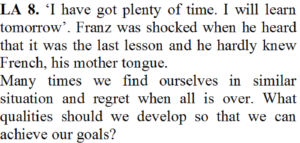

Answer: Franz recalls that he had all the time available to learn his mother tongue. All of a sudden teachings in French was stopped. Now he repents for not having paid full attention to his studies.
The situations of not utilizing the time and opportunity are very common. Many people have a wrong notion that things shall not change. Alas, they prove themselves wrong.
Some students do not prepare for exam right from the beginning of academic year. Towards the end it becomes too much to handle all the curriculum.
At the young age many would waste their earnings. They fail to save and invest adequately for their future needs. However hard they try to make up at a later stage of life, situation remains difficult for them.
Procrastination is a slow poison that not only affects an individual but the whole family.
We must make consistent efforts to achieve goals of life. Even if we take small steps regularly and on time, we can succeed in life.


Answer: A baby takes her first lesson of language from mother. These lessons would always be in the mother tongue – figuratively and actually. As the child grows her vocabulary keeps expanding. She learns through everybody.
She communicates with friends in native language. She learns folk stories and folklore through elders of the family. All in native language.
With so much learning and communication in native language, an affinity gets naturally developed. One would start taking pride in it.
In ‘The Last Lesson’, elders had come to the classroom on their own. The only purpose of their presence was to express their solidarity to their native language French. Such powerful is the attachment to native language.
M Hamel has been teaching French at the school for forty years. He was now bidding farewell to the school. With profound emotions he makes an appeal to guard the language.
Thus we can conclude that native language has an emotional attachment to everybody.


Answer: M Hamel announced in the class that an order had come from Berlin to teach only German in the schools of Alsace and Lorraine. The new teacher would come from tomorrow. Therefore it was the last lesson in French.
These words were a thunderclap for Franz. Now he understood what notice was put up at the bulletin board.
Franz realizes that he hardly knew how to write French. He repents having neglected his lessons in the past. Earlier he considered his books a nuisance. But now he considered these his old friends. He did not want to give up his books.
Franz forgot all about Hamel’s ruler and his cranky ways. Franz felt that Hamel had tried to teach them for their own good.
In all, Franz repented his negligence. His thoughts were now full of respect for M Hamel.
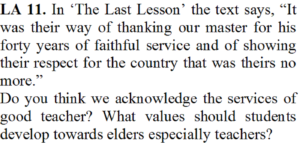

Answer: The presence of elders in the class room to show their respect to M Hamel is a motivating aspect.
We respect our elders for their wisdom and experience. It is through elders that we learn social values and virtue of harmonious relations. The legacy of rich culture is passed on to posterity through elders. We must give them time and care they deserve. It is our duty.
Teachers are our guide and mentor. They impart us knowledge. They develop analytical and comprehending skills in students. Through extra-curricular activities, virtues of teamwork and friendship is inculcated. They impart us lessons of moral values. Each of this virtue stands a good stead throughout our life.
Every student should learn to appreciate the richness a teacher brings into his life. During schooling days what a student learns serves as a strong foundation for his entire life time.
We must remained indebted and faithful to our elders and teachers.


Answer: M Hamel announced in the class that an order had come from Berlin to teach only German in the schools of Alsace and Lorraine. The new teacher would come from tomorrow. Therefore it was the last lesson in French.
He repented that French could not be fully learnt by residents. He blamed villagers, students and himself for the delay. He said that now Germans will laugh at them for not knowing their mother tongue. He advised everybody to guard their own language and not to forget it.
At the end of the lesson he wrote on the blackboard, “Vive La France” and gestured that school was dismissed.
Everybody was shocked to know that it was the last lesson in French. Franz cursed Germans for issuing such an order. Franz noticed that he could understand the lesson very well on that day.
They paid full attention to the lesson of that day. They had become very emotional. Old Hauser started crying while spelling his lesson.
It was indeed a very sad day for all of them.


Answer: Franz had not studied his lesson carefully. He often missed his classes. He did not pay enough attention in the class.
Parents were not anxious enough to motivate their children to learn. Many times they preferred to send their children to farm or to mills to earn some money for the family.
Elders of the town had not devoted much time in learning their mother tongue.
On several occasions M Hamel had sent student to water his garden instead of teaching them. Whenever he went for fishing he announced holiday for students.
Each of them thought they had enough time to learn. But now only German will be taught in the school. They do not have the opportunity to learn their mother tongue.
Hence it is bad to cause delay in any activity.


Answer: It is a human tendency to take things for granted. Hence the moment a change takes place, they are disturbed.
The school teacher will always remain with a student, a student takes for granted. But a teacher may get transferred to another school.
Mother would always be able to take all the care she has been, is taken for granted. If mother is away just for a day, her absence is felt.
So goes for the health. If one loses the opportunity to remain fit, the impact could be severe for oneself as well as for the family.
In the text ‘Last Lesson’, people thought presence of Mr. Hamel would continue. Mr. Hamel too believed that he would continue in the school. When these situations got altered, everybody realised the importance of opportunity they had lost.
Thus we should take advantage of opportunity available to us. Remember, change is the only thing that is constant in the world.
****



0 Comments